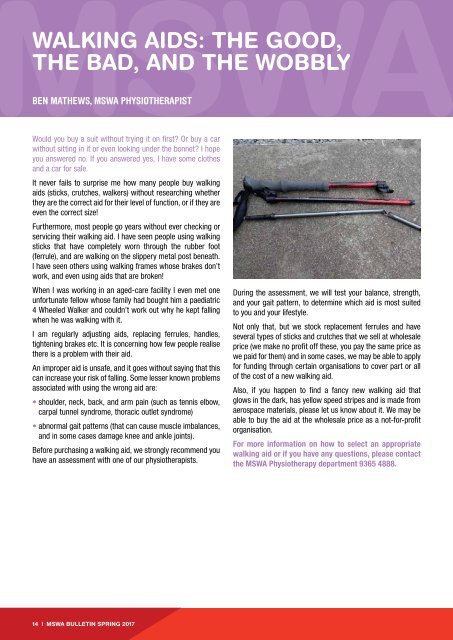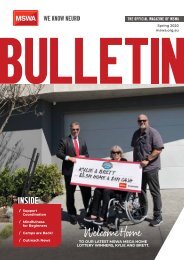MSWA Bulletin Magazine Spring 17_WEB
You also want an ePaper? Increase the reach of your titles
YUMPU automatically turns print PDFs into web optimized ePapers that Google loves.
WALKING AIDS: THE GOOD,<br />
THE BAD, AND THE WOBBLY<br />
BEN MATHEWS, <strong>MSWA</strong> PHYSIOTHERAPIST<br />
Would you buy a suit without trying it on first? Or buy a car<br />
without sitting in it or even looking under the bonnet? I hope<br />
you answered no. If you answered yes, I have some clothes<br />
and a car for sale.<br />
It never fails to surprise me how many people buy walking<br />
aids (sticks, crutches, walkers) without researching whether<br />
they are the correct aid for their level of function, or if they are<br />
even the correct size!<br />
Furthermore, most people go years without ever checking or<br />
servicing their walking aid. I have seen people using walking<br />
sticks that have completely worn through the rubber foot<br />
(ferrule), and are walking on the slippery metal post beneath.<br />
I have seen others using walking frames whose brakes don’t<br />
work, and even using aids that are broken!<br />
When I was working in an aged-care facility I even met one<br />
unfortunate fellow whose family had bought him a paediatric<br />
4 Wheeled Walker and couldn’t work out why he kept falling<br />
when he was walking with it.<br />
I am regularly adjusting aids, replacing ferrules, handles,<br />
tightening brakes etc. It is concerning how few people realise<br />
there is a problem with their aid.<br />
An improper aid is unsafe, and it goes without saying that this<br />
can increase your risk of falling. Some lesser known problems<br />
associated with using the wrong aid are:<br />
• shoulder, neck, back, and arm pain (such as tennis elbow,<br />
carpal tunnel syndrome, thoracic outlet syndrome)<br />
• abnormal gait patterns (that can cause muscle imbalances,<br />
and in some cases damage knee and ankle joints).<br />
Before purchasing a walking aid, we strongly recommend you<br />
have an assessment with one of our physiotherapists.<br />
During the assessment, we will test your balance, strength,<br />
and your gait pattern, to determine which aid is most suited<br />
to you and your lifestyle.<br />
Not only that, but we stock replacement ferrules and have<br />
several types of sticks and crutches that we sell at wholesale<br />
price (we make no profit off these, you pay the same price as<br />
we paid for them) and in some cases, we may be able to apply<br />
for funding through certain organisations to cover part or all<br />
of the cost of a new walking aid.<br />
Also, if you happen to find a fancy new walking aid that<br />
glows in the dark, has yellow speed stripes and is made from<br />
aerospace materials, please let us know about it. We may be<br />
able to buy the aid at the wholesale price as a not-for-profit<br />
organisation.<br />
For more information on how to select an appropriate<br />
walking aid or if you have any questions, please contact<br />
the <strong>MSWA</strong> Physiotherapy department 9365 4888.<br />
14 | <strong>MSWA</strong> BULLETIN SPRING 20<strong>17</strong>


















